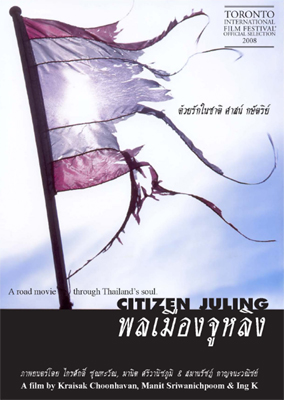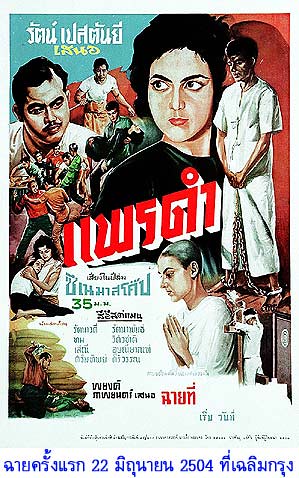
Significant holdings of Thailand's National Film Archive will be on display at this year's Singapore International Film Festival.
The website for the 22nd annual edition of SIFF has gone live and it's chock full of connections to Thai cinema.
Under special programs is
25 Years of the National Film Archive of Thailand, which features recently restored classic features, works by Ratana Pestonji and Vichit Kounavudhi and historical footage.
The two projects of the
restoration work sponsored by the Thomson Foundation and Technicolor Thailand,
The Boat House and
King of the White Elephant will be shown.
From 1961, the restored version of
The Boat House was unveiled last year in a one-off screening in Bangkok for VIPs. The general public had their chance to see the new print at the Bangkok International Film Festival. I had heard of plans to use
The Boat House for a series of screenings to benefit the National Film Archive. I am not sure why those plans have not yet materialized (will they ever?), but perhaps the Singapore fest is a higher-profile venue for this highly entertaining cavalcade of music and action involving three roommates -- a policeman, a boxer-turned-bandit and an alcoholic singer -- who all fall for the daughter of their landlord.
King of the White Elephant was the first project of the Thai Technicolor restoration effort, and it was unveiled at 2007's inaugural Phuket Film Festival. The 1941 black-and-white historical-action epic is an important film for a number of reasons -- it's Thailand's oldest surviving complete feature film, it's an English-language film, and it was produced by statesman Pridi Banomyong for purposes of anti-war propaganda.
From pioneer director Ratana Pestonji, there will be a rare screening of
Diamond Finger (
Niew Phetr), a short documentary of a khon (masked dance) episode from the
Ramayana. I'm not sure many people are aware of this work, which I first glimpsed snippets of last year in Chalida Uabumrungjit's documentary
Signature: The Life and R.D. Pestonji, which will be shown alongside
Diamond Finger in Singapore.
Recently released on DVD by the Thai Film Foundation, Pestonji's final feature, 1965's provocative romantic comedy
Sugar Is Not Sweet, will also be shown. (It's also being shown
at the Fringe Festival.)
And there's
Son of the Northeast (
Look Isan), from Vichet Kounavudhi, a contemporary of Pestonji's. A
nature-filled 1982 drama that follows a family of subsistence farmers in 1930s northeast Thailand, it's probably Vichet's best film and is an enduring classic of Thai cinema.
Gems from the Thai Film Archive is a 63-minute compilation of historic footage, ranging from a one-minute clip of King Chulalongkorn's 1897 visit to Berne, Switzerland, to a 30-minute 1929 short by King Prajadhipok called
The Magic Ring. Other works in
Gems are a one-minute clip of the arrival of King Chulalongkorn by ship in Stockholm in 1897, 10 minutes of the coronation ceremony of King Rama VII from 1926, the surviving one minute of film from 1927's
Double Luck, which is believed to be the first Thai-produced feature film, and 20 minutes of the Australsasian tour by Prince Purachatr of Kambangpetch.
This is great international exposure for Thailand's National Film Archive, which is
trying to raise 10 million baht to fund the building of another climate-controlled vault.
By the way, the archive's director, Dome Sukwong, was honored for lifetime achievement at
this year's Subahanahongsa Awards. I wonder if the Thai film industry will back that honor with generous financial assistance for the Archive? Perhaps instead of spending money on anti-piracy efforts that aren't really stopping piracy, Thailand's film industry group could direct resources to preserving Thai film?
More Thai films are featured in other sections of the Singapore festival.
The Cinema Today section has
The Convert (
Muallaf),
last year's documentary by Panu Aree, Kaweeipon Ketprasit and Kong Rithdee on a Buddhist Thai woman's marriage and conversion into Islam.
And there's
A Moment in June, O Nathapon's
lush romantic drama that looks like a 1960s or '70s Thai film. It premiered last year and is playing in Thai cinemas now.
There's a new management team for the Singapore fest -- Wahyuni A. Hadi and Zhang Wenjie were appointed directors after last year's festival, with founding festival directors Philip Cheah, Lesley Ho and Teo Swee Leng stepping aside. (Cheah remains a board member.) And there's a new section called In Focus, which looks to "reflect and examine the state of the world today, going behind the headlines to reveal the stories that need to be hear".
Part of that new section is Uruphong Raksasad's
Agrarian Utopia, which premiered at the recent
International Film Festival Rotterdam. Disappointingly, it will be screened in the less-than-ideal classroom-style setup at Singapore's Goethe Institut -- that's why it's free. Lav Diaz's 450-minute
Melancholia is showing at that venue too. But I'll hold out hope that it comes to Bangkok and shows in a proper cinema.
Lastly, there's the opening film,
Sincerely Yours (
Qilu Tianang), which is also part of the Asian Feature Film Competition for the Silver Screen Awards. By Singaporean director Rich Lee,
Sincerely Yours stars Banlop Lomnoi from
Tropical Malady as a Thai migrant named Supawong who's working illegally in Taiwan. He strikes up a relationship with another illegal worker, a Javanese woman named Setia (Lola Amaria).
Also, Ananda Everingham is a juror for the Asian Feature Film Competition.
The 22nd Singapore International Film Festival runs from April 14 to 25.
(Thanks Stefan!)
 With a Thai government that looks like it might take hold and last longer than just a few months, there's a new culture minister, Teera Slukpetch, a Democrat from Trat. He's had a chance to get down to work, approving two measures that could well prove historic for Thai cinema.
With a Thai government that looks like it might take hold and last longer than just a few months, there's a new culture minister, Teera Slukpetch, a Democrat from Trat. He's had a chance to get down to work, approving two measures that could well prove historic for Thai cinema.


































